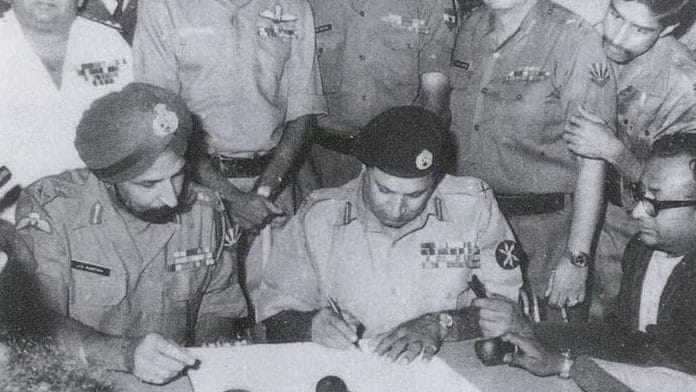New Delhi: In a powerful display of cross-border solidarity, activists, students, and journalists from India and Pakistan came together online to confront the shared pain of the conflict between the two countries. Despite geopolitical divides, their voices echoed a common truth. Together, they called for empathy, peace, and a rejection of divisive nationalistic rhetoric.
“It has been 80 years. Even after fighting four wars, our governments have not understood that this problem cannot be solved with military means,” said Monica Wahi, one of the hosts of the event and a public health researcher from India.
The virtual event, We Want Peace, Not War: India-Pakistan Youth Dialogue, was organised on Wednesday by the Socialist Yuvjan Sabha, the youth wing of Socialist Party (India). It brought together young people from both countries for a candid conversation. Through personal reflections and ideological critiques, participants rejected militarisation and political exploitation.
Instead, they advocated grassroots solidarity, especially among youth, feminists, and marginalised communities. They called for diverting military funds to education, healthcare, and employment, stressing that true security lies in dignity, not weapons.
Several initiatives have come up advocating for peace and collective healing. The Southasia Peace Action Network (Sapan) is one such organisation, which has been holding online discussions since March 2021 on critical issues like human rights, climate change, and the social costs of conflict. These virtual events are bringing together voices from India, Pakistan, and the broader South Asian diaspora. Supported by over 105 organisations and thousands of individuals, Sapan promotes cross-border collaboration, with a recent peace petition gathering nearly 7,500 signatures.
“We’re caught up in bombs, hatred, and drones. There is not much difference between the guards of homes and the guards of borders. In wars, 75 per cent of those displaced are women and children. Education, business and dreams are snatched away,” said Benish Rubab Laila, one of the speakers from Islamabad, highlighting the absurdity of rising defence budgets while education and healthcare suffer.
Pain and the power of memory
Mahreen Talha, a child rights activist from Pakistan, recalled an elder in Rawalpindi talking about school drills during times of tension—a stark contrast to her own generation’s more distant experience of conflict. That made her realise how the scars of the past still shape their lives today, and how important it is to break that cycle for the sake of future generations.
“People often compare Pakistan and India, but I don’t agree,” she said. “Pakistan is smaller and faces greater economic and social challenges. Yet, the media and politicians frame it as a match-up, ignoring the real differences in military, economic, and social power.”
She also emphasised the growing military influence in Pakistan, particularly the promotion of Asim Munir to Field Marshal, drawing parallels with the authoritarian era of Mohammad Zia-ul-Haq.
Much like Talha’s reflections on generational trauma, filmmaker Vishal Stonewall’s work in Uttar Pradesh highlights how conflict and division continue to shape communities through political manipulation and hatred.
Based in Shamli, Stonewall has spent years documenting the social unraveling that followed the 2013 Muzaffarnagar riots. His focus on Dalit Muslims reveals a profound shift in communal relations, now driven by hate-fuelled politics and misinformation.
He remembers a different time—when Hindu and Muslim farmers stood side by side, united under the banner of the Indian Farmers’ Union. But that solidarity, he says, was torn apart in the wake of violence.
“Since 2013, I have been looking at the political and social situation here,” Stonewall said. “It was not like this in Uttar Pradesh before. An environment of hate was created, and small incidents snowballed into something much bigger.”
Also read: During India-Pakistan war clouds, Delhi book launch panelists discussed democracy
The emotional toll of war
A participant drew attention to the British rule, blaming “colonisers” for creating a communal rift that continues to fester.
“Pakistan and India were not free; they were torn apart by colonisers, leaving us with hatred and identity politics,” said the participant who did not want to be identified.
Participants from both sides of the border acknowledged the emotional toll of war, revealing how it seeps into everyday lives, dehumanising both the individual and society.
“We have not come to prove anyone right or wrong. But our aim is that we share our pain, share our experiences,” said Sara Khalid, a co-host. War, she added, is glorified by a section of society while its true impact is measured in the silence it leaves behind and the hatred it cultivates.
Javed, a participant from Baramulla in Kashmir, spoke about life in the Valley being clouded by fear, isolation, hopelessness, and an unshakable desire for change. He added that the national media has vilified Kashmiris to such an extent that the damage now runs deeper than defamation—it has become humiliation. At the same time, policies that could uplift the poor are either missing or actively harming them.
(Edited by Aamaan Alam Khan)






